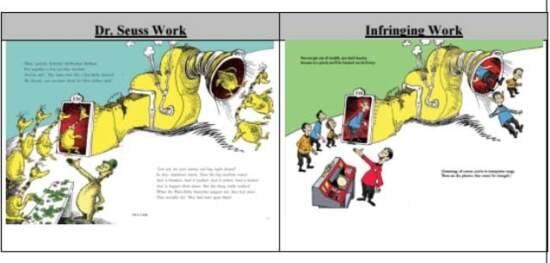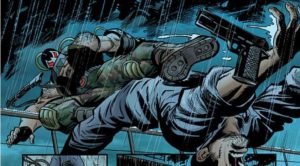It is a rare day that a Kickstarter campaign – and a successful one, raising $30000 – for a comic book goes on to detail intellectual property infringement as a legal risk for the venture:
While we firmly believe that our parody, created with love and affection, fully falls within the boundary of fair use, there may be some people who believe that this might be in violation of their intellectual property rights. And we may have to spend time and money proving it to people in black robes. And we may even lose that.
The statement was made by the project’s creators, Glenn Hauman, David Friedman, and Ty Templeton, and their Connecticut company ComicMix LLC.
ComicMix is a website providing news and reviews on comic books. (Interestingly, it features a column, “The Law is an Ass”, written by Bob Ingersoll, an Ohio-based attorney and comic book writer.)
Ty Templeton is well known for his work on various “Batman” comics, published by American publisher DC Comics, and has won various Eisner and Joe Shuster awards for his creative efforts on comic books. Glenn Hauman has worked on various Star Trek novels and electronic publications, and knows enough about the law, according to Wikipedia, to have been the chair of the Netlaw special interest group of the World Wide Web Artists Consortium.
On 11 November 2016 each of them were sued in a Californian court by Dr Seuss Enterprises, LLP (“DSE”).
DSE is the owner of around sixty Dr Seuss books, written between 1937 and 1990. More than 650 million of these books have been sold globally. Perhaps the most famous of the Dr Seuss titles are “The Cat in the Hat” (made into a motion picture), “The Lorax”, “Oh, the Places You’ll go!” and “Green Eggs and Ham”.
The complaint initiating the action states that:
“The Infringing Work infringes DSE’s works by innumerable copyrighted elements of several well-known Dr Seuss works, including the work’s settings, illustrations, characters, prose and themes. The Infringing Work unabashedly misappropriates DSE’s intellectual property to create a “look and feel” of an authorised Dr Seuss work.”
The action accordingly has been brought alleging copyright infringement, trade mark infringement, and unfair competition contrary to the US Lanham Act and also the Californian Unfair Competition, Business and Professions Code.
Dr Seuss books are known for their “simple, rhyming, repetitive prose” and “zany animals with human-like characteristics”, as set out in the complaint.
So what is the substance of the complaint? The complaint alleges that the “book purports to be an amalgamation of the Dr Seuss works and certain characters, imagery and other elements from Star Trek, the well-known science fiction entertainment franchise created by Gene Roddenbury.”

There is no denying the humour to the allegedly infringing work: here, how Star Trek’s teleportation system works in the world of Dr Seuss –

In terms of the remedies that Dr Seuss Enterprises is seeking, these include:
a. $150,000 in damages for “each separate Dr. Seuss Copyrighted Work”
b. An account of profits;
c. An injunction.
Under US law, wilful infringement of the Lanham Act gives rise to a claim for “treble damages”, and DSE are seeking this, too. As it evolves, the warning by the creators in the Kickstarter campaign was not the wisest thing to do, because it is clear evidence of wilful infringement.
The defendants will no doubt raise parody as a defence, claiming fair use.
This is not the first time DSE has taken action in respect of a copyright infringer engaging in parody. In 1997, DSE sued Penguin Books concerning a “The Cat in the Hat” parody of OJ Simpson’s famous murder trial:

DSE were successful in obtaining a preliminary injunction prohibiting publication and distribution of that book. The US Ninth Circuit Court of Appeals noted that “the claim of parody is no defense where the purpose of the similarity is to capitalize on a famous mark’s popularity for the defendant’s own commercial use.” Hard Rock Cafe Licensing Corp. v. Pacific Graphics, Inc., 776 F.Supp. 1454, 1462 (W.D.Wash.1991).” On the basis of that reasoning alone, prospects look grim for the defendants in this new dispute. No doubt if an injunction is issued, “Oh the Places You’ll Boldly Go!” will become instantly collectable and valuable by reason of its scarcity.

